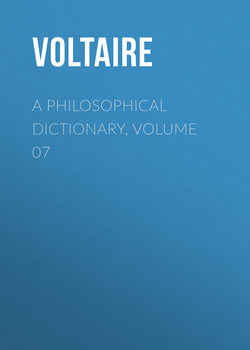A Philosophical Dictionary, Volume 07

Реклама. ООО «ЛитРес», ИНН: 7719571260.
Оглавление
Voltaire. A Philosophical Dictionary, Volume 07
JOSEPH
JUDÆA
JULIAN
JUST AND UNJUST
JUSTICE
KING
KISS
LAUGHTER
LAW (NATURAL)
LAW (SALIC)
LAW (CIVIL AND ECCLESIASTICAL)
LAWS
LAWS (SPIRIT OF)
LENT
LEPROSY, ETC
LETTERS (MEN OF)
LIBEL
LIBERTY
LIBERTY OF OPINION
LIBERTY OF THE PRESS
LIFE
LOVE
LOVE OF GOD
LOVE (SOCRATIC LOVE)
LUXURY
MADNESS
MAGIC
MALADY – MEDICINE
MAN
MARRIAGE
MARY MAGDALEN
MARTYRS
MASS
MASSACRES
MASTER
MATTER
MEETINGS (PUBLIC)
MESSIAH
METAMORPHOSIS
METAPHYSICS
MIND (LIMITS OF THE HUMAN)
MIRACLES
MISSION
Отрывок из книги
I never was in Judæa, thank God! and I never will go there. I have met with men of all nations who have returned from it, and they have all of them told me that the situation of Jerusalem is horrible; that all the land round it is stony; that the mountains are bare; that the famous river Jordan is not more than forty feet wide; that the only good spot in the country is Jericho; in short, they all spoke of it as St. Jerome did, who resided a long time in Bethlehem, and describes the country as the refuse and rubbish of nature. He says that in summer the inhabitants cannot get even water to drink. This country, however, must have appeared to the Jews luxuriant and delightful, in comparison with the deserts in which they originated. Were the wretched inhabitants of the Landes to quit them for some of the mountains of Lampourdan, how would they exult and delight in the change; and how would they hope eventually to penetrate into the fine and fruitful districts of Languedoc, which would be to them the land of promise!
Such is precisely the history of the Jews. Jericho and Jerusalem are Toulouse and Montpellier, and the desert of Sinai is the country between Bordeaux and Bayonne.
.....
Perhaps, by attending a little to the progress of his life, and the nature of his character, we may discover what it was that inspired him with so strong an aversion to Christianity. The emperor Constantine, his great-uncle, who had placed the new religion on the throne, was stained by the murder of his wife, his son, his brother-inlaw, his nephew, and his father-in-law. The three children of Constantine began their bloody and baleful reign, with murdering their uncle and their cousins. From that time followed a series of civil wars and murders. The father, the brother, and all the relations of Julian, and even Julian himself, were marked down for destruction by Constantius, his uncle. He escaped this general massacre, but the first years of his life were passed in exile, and he at last owed the preservation of his life, his fortune, and the title of Cæsar, only to Eusebia, the wife of his uncle Constantius, who, after having had the cruelty to proscribe his infancy, had the imprudence to appoint him Cæsar, and the still further and greater imprudence of then persecuting him.
He was, in the first instance, a witness of the insolence with which a certain bishop treated his benefactress Eusebia. He was called Leontius, and was bishop of Tripoli. He sent information to the empress, "that he would not visit her unless she would consent to receive him in a manner corresponding to his episcopal dignity – that is, that she should advance to receive him at the door, that she should receive his benediction in a bending attitude, and that she should remain standing until he granted her permission to be seated." The Pagan pontiffs were not in the habit of treating princesses precisely in this manner, and such brutal arrogance could not but make a deep impression on the mind of a young man attached at once to philosophy and simplicity.
.....